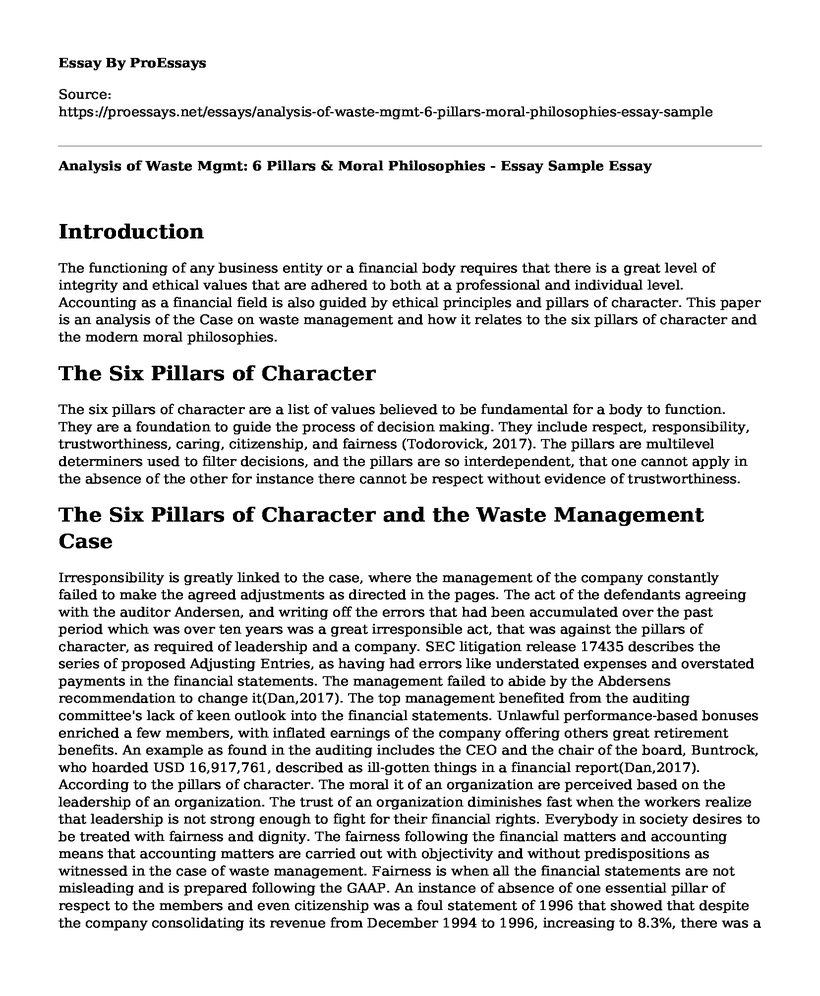Introduction
The functioning of any business entity or a financial body requires that there is a great level of integrity and ethical values that are adhered to both at a professional and individual level. Accounting as a financial field is also guided by ethical principles and pillars of character. This paper is an analysis of the Case on waste management and how it relates to the six pillars of character and the modern moral philosophies.
The Six Pillars of Character
The six pillars of character are a list of values believed to be fundamental for a body to function. They are a foundation to guide the process of decision making. They include respect, responsibility, trustworthiness, caring, citizenship, and fairness (Todorovick, 2017). The pillars are multilevel determiners used to filter decisions, and the pillars are so interdependent, that one cannot apply in the absence of the other for instance there cannot be respect without evidence of trustworthiness.
The Six Pillars of Character and the Waste Management Case
Irresponsibility is greatly linked to the case, where the management of the company constantly failed to make the agreed adjustments as directed in the pages. The act of the defendants agreeing with the auditor Andersen, and writing off the errors that had been accumulated over the past period which was over ten years was a great irresponsible act, that was against the pillars of character, as required of leadership and a company. SEC litigation release 17435 describes the series of proposed Adjusting Entries, as having had errors like understated expenses and overstated payments in the financial statements. The management failed to abide by the Abdersens recommendation to change it(Dan,2017). The top management benefited from the auditing committee's lack of keen outlook into the financial statements. Unlawful performance-based bonuses enriched a few members, with inflated earnings of the company offering others great retirement benefits. An example as found in the auditing includes the CEO and the chair of the board, Buntrock, who hoarded USD 16,917,761, described as ill-gotten things in a financial report(Dan,2017). According to the pillars of character. The moral it of an organization are perceived based on the leadership of an organization. The trust of an organization diminishes fast when the workers realize that leadership is not strong enough to fight for their financial rights. Everybody in society desires to be treated with fairness and dignity. The fairness following the financial matters and accounting means that accounting matters are carried out with objectivity and without predispositions as witnessed in the case of waste management. Fairness is when all the financial statements are not misleading and is prepared following the GAAP. An instance of absence of one essential pillar of respect to the members and even citizenship was a foul statement of 1996 that showed that despite the company consolidating its revenue from December 1994 to 1996, increasing to 8.3%, there was a reported decline of net income in the period by almost 75%, which was unreasonable and showed lack of transparency (Dan, 2017). The act of the company of manipulating income numbers to minimize decline is unethical. The modern moral philosophies are concerned with the concepts of whatever is treated as right or wrong in society. It focuses on both the metaethics and the normative ethics, and a basis for the formation of ethical standards in accounting (Merchant &White,2017). It sets the required standards for professionals and their response to financial matters while attempting to cultivate integrity and accountability.
Conclusion
The Waste Management case overview is an analysis of the accounting and management decisions that were unethical and lacked transparency. The roles of Arthur Andersen and the 1992 to 1997 fraud are highlighted as a major breach of the basic ethical codes of work as stated in the six pillars of character. The financial statement frauds common in the 1990s undermined financial institutions, making employees lose trust in them, hence the creation of ethical standards as stipulated in the modern moral philosophies that emphasize, both met ethics and normative ethics.
References
Dan, A. K. (2017). Creative Accounting-a Creation for Destruction: concerning Some Global Instances. http://bjcm.bescollege.net/v3/n1/v3n101.pdf
Merchant, K. A., & White, L. F. (2017). Advances in Management Accounting. https://www.researchgate.net/profile/Mohamed_Mourad_Lafifi/post/Looking_for_sources_which_explain_perception_of_intensity_of_external_control_not_control_over_the_work_Some_suggestions/attachment/5d3ae03ecfe4a7968db97bcf/AS%3A784872448724992%401564139582258/download/LINKING+THE+ETHICS+AND+MANAGEMENT+CONTROL+LITERATURES+_+Merchant2017.pdf
Todorovic, Z. (2018). Application of the Ethics Code and Rules of Professional Conduct of Accounts and Auditors. Edited by Zoran Cekerevac. MEST Journal, 135-149. https://mest.meste.org/MEST_Najava/XII_Todorovic.pdf
Cite this page
Analysis of Waste Mgmt: 6 Pillars & Moral Philosophies - Essay Sample. (2023, Jul 24). Retrieved from https://proessays.net/essays/analysis-of-waste-mgmt-6-pillars-moral-philosophies-essay-sample
If you are the original author of this essay and no longer wish to have it published on the ProEssays website, please click below to request its removal:
- Surfactants, Magnetic Field, Cleaning up Oil on Birds' Feathers
- Learning Ecological and Ethical Perspectives in Education Paper Example
- Lake Mead Zooplankton: Studying the Impact of Climate Change - Research Paper
- Essay Example on Industrial Pollution: A Business Problem Facing Manufacturing Industries
- Paper Example on GDP: Aggregate Traded Income or Products & Services?
- Paper Example: Ensuring Risk Mitigation During Earthquakes in Sentinel City
- Report Example on Volcanic Massive Sulphide







